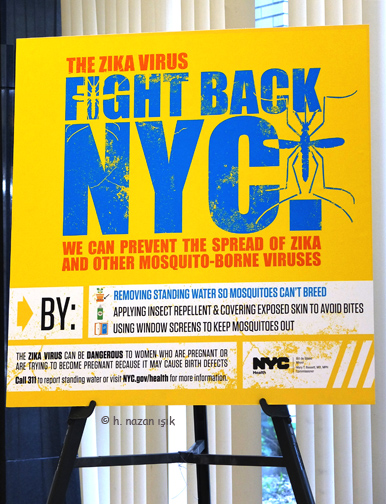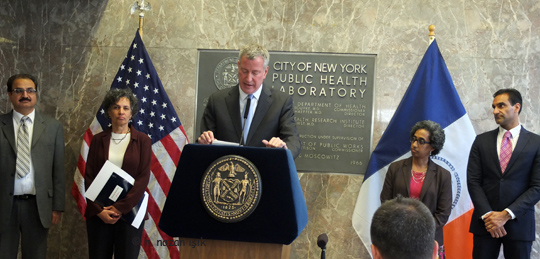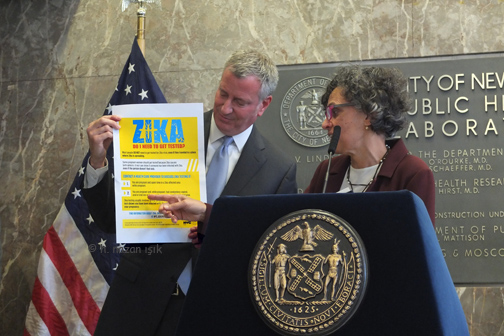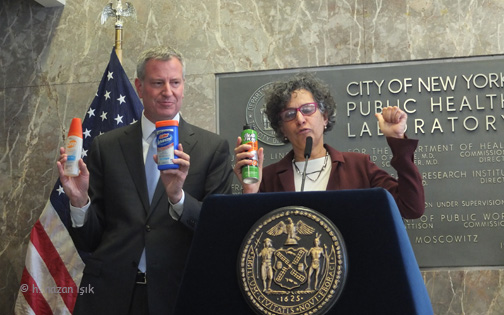h. nazan ışık—
27 Nisan 2016—
On Monday, 18 April Mayor de Blasio announced a three-year, $21 million plan to fight the mosquito-borne Zika virus in five boroughs.
Before the conference started, a flier on an easel, saying “The Zika Virus, Fight back NYC , We Can Prevent the Spreag of Zika Virus in New York City “ was ready to be introduced.
Mayor de Blasio came with (from left to right) Dr. Waheed Bajwa, the Executive Director of Vector Surveillance and Control for the Department of Health; Dr. Mary Bassett, Commissioner of Department of Health and Mental Hygiene; Dr. Herminia Palacio, Deputy Mayor for Health and Human Services; Dr. Jay Varma , the Deputy Commissioner for Disease Control for the Department of Health and Mental Hygiene, to detail the plan.
“We are announcing today a three-year plan. It will cover all five boroughs. It’s a three-year, $21 million plan to address the Zika crisis and to ensure that New York City is prepared to keep our people safe. The threat of Zika we take very seriously. This is an emerging situation and new information keeps coming out. “ Mayor Bill de Blasio said.
The $21 million plan has three key parts: First, reducing the amount of mosquitoes in New York City. Second, detecting the presence of the disease. Third, educating New Yorkers to protect themselves, and to understand basic precautions they can take.
The plan will add 51 new Department of Health workers, including exterminators, inspectors, and lab analysts, and will increase the number of the mosquito traps across the city to fight against Zika virus.
Dr. Mary Bassett came to the lectern. And Mayor de Blasio held a smaller “Zika” flier, which will be part of the public education effort.
“Thank you Mr. Mayor, my prop holder for the moment. “ said Dr. Bassett, Everybody laughed.
“As we enter mosquito season, our message is to help us fight the spread of Zika virus in New York City with the slogan Fight Back NYC. “ said Dr. Mary Bassett. And, continued: “The mosquito causing Zika outbreak in Latin America – Aedes aegypti – has not been found here in New York City, but we have a related species – Aedes albopictus – that could carry and transmit the virus.”
Dr. Mary Bassett explained how the virus spreads: “The way this works – it’s very important that people understand that this isn’t a person-to-person spread – is that the mosquito would bite a New Yorker who’d return from some place where they’d acquire Zika infection. That mosquito might then acquire the virus, and then bite someone else, and give them the virus.
New Yorkers can help fight the spread of mosquito-borne viruses by following simple steps:
—Remove standing water such as flower pot, the bird feeder..etc. This mosquito, Aedes albopictus, can breed in tiny containers of water, even in a bottle cap.
—Install window screens.
—Wear protective clothing; cover your legs, arms.
—If you’re pregnant, or planning to become pregnant, delay to travel to regions where Zika transmission is ongoing.
—If you must travel to one of these areas, take precautions to avoid mosquito bites, and talk to your doctor before travelling.
—Use mosquito repellant. Look for the ones have DEET, picaridin, or lemon oil of eucalyptus.
All five of them held some examples of mosquito repellants.
Mayor: So, these are actual examples of the types of repellants that work and are approved by the New York City Department of Health.
Zika also can be transmitted sexually.
Zika is present in 34 Latin American and Caribbean countries and territories.
The unborn babies of women, who have Zika infection during pregnancy, are the real victims. The virus causes fetal death and birth defects. And, there is no Zika vaccine.
Mayor said, “I want to emphasize that no one has been infected in New York City by the Zika virus. There have been roughly 358 travel-related cases of Zika, with people coming to the United States who were infected elsewhere – 358 for the entire country.
Now, 40 of those cases have been found in New York City – folks who’ve contracted the disease elsewhere and came here.”
Dr. Mary Bassett: ” We’ve identified six women who are – who were pregnant at the time that they were diagnosed with Zika. And we protect their privacy.” said.
And recommended that:
—If you are pregnant, and spent time in a Zika-affected area while pregnant, get tested.
—If you’re pregnant, and while pregnant had condom-less vaginal, anal, or oral sex with a man who spent time in a Zika-infected area, get tested.
She continued: “And last – although Zika is almost always transmitted through mosquito bites, it also can be transmitted sexually. So, we want to remind New Yorkers that condoms are a safe and effective way to protect themselves from sexually-transmitted diseases and Zika. “
“Well, we expect as the summer months to go on that we’ll see more and more imported cases in New York City. So that number, 40, will go up. And we also know that travel from the areas where Zika virus transmission is ongoing will increase in the months of July and August.”
(She was right! Since the press conference on 18 April, numbers increased to 59 cases, and 8 of them are pregnant. And it is not even July and August yet.)
If you want to find free condoms, call 3-1-1 to find out where the free NYC-branded condoms would be available to you. “
More information about the Zika virus, including latest number of cases, facts about the disease, travel warnings, countries affected and mosquito prevention tips, can be found here on the City’s Health Department website.
Photograps © h. nazan ışık / All rights reserved
© h. nazan ışık / NKENdiKEN




